Tax Relief Proposals for Budget 2025: Key Changes for Individuals and Non-Corporates

News Synopsis
As the Budget 2025 announcement draws closer, taxpayers, professionals, and industry experts are eagerly awaiting potential changes to the personal income tax structure. The Bombay Chartered Accountants' Society (BCAS) has outlined a set of crucial proposals aimed at reducing the tax burden on individuals and non-corporate entities while addressing existing disparities in the tax regime.
Lower Tax Rates for Non-Corporates and High-Income Individuals
A key recommendation from the Bombay Chartered Accountants' Society (BCAS) is the reduction of tax rates for individuals, with the maximum rate being capped at 30%, inclusive of surcharge and cess. The proposal also suggests a reduction in tax rates for non-corporate entities such as Limited Liability Partnerships (LLPs) and Association of Persons (AOPs), lowering them to 25%.
This approach seeks to align tax rates for non-corporates more closely with those for corporations, aiming to enhance fairness and alleviate financial strain on non-corporate taxpayers.
Fair Tax Treatment for Provident Fund Interest
The BCAS has highlighted the need to standardize the tax treatment of interest accrued on Government Provident Fund (GPF) and Recognized Provident Fund (RPF). One key proposal includes exempting interest earned after retirement or termination of employment from recognized provident funds, ensuring that these funds are treated fairly in terms of taxation, especially for those who rely on them for post-retirement security.
Taxation of Life Insurance and Indexation Benefits
A major recommendation is the reclassification of maturity proceeds from life insurance policies, suggesting that they should be taxed under "capital gains" rather than as "income from other sources." Additionally, the BCAS proposes extending the benefits of indexation to life insurance policies, ensuring that the valuation of such policies is fairer and more aligned with inflation.
Clarifying Section 9B Ambiguities
The BCAS has called for clarity around Section 9B, recommending that fair market value be designated as the cost of acquisition for specified persons. This clarification would streamline the taxation process and minimize potential disputes, ensuring greater transparency and ease of compliance.
Revision of ‘Substantial Contributor’ Definition
Another significant proposal is the revision of the definition of a "substantial contributor" under Sections 13(2) and 13(3). The current threshold of ₹50,000 is suggested to be increased to ₹50 lakh or indexed to gross receipts. This change aims to reflect inflation and the changing economic landscape, as the current threshold has remained unchanged for the past 25 years.
Simplifying Rental Income Taxation
The BCAS proposes a more straightforward approach to the taxation of rental income, suggesting that it should be based on the actual rent received or receivable rather than the annual value determined under Section 23. Furthermore, the concept of "deemed let-out property" would be eliminated, addressing the issue of taxpayers being burdened with tax liabilities based on notional rental income.
Enhanced Deductions and Allowances
The BCAS recommends increasing the deductions under Section 80U for individuals with disabilities, along with additional allowances for caregiving and the use of assistive devices. For self-occupied properties, the society suggests raising the interest deduction limit under Section 24(b) to ₹10 lakh for properties in metro cities and ₹5 lakh for properties in non-metro cities.
Amendments to Section 54 for High-Value Properties
The BCAS has proposed amendments to Section 54, particularly in relation to high-value residential properties. The society advocates for changes that would prevent double taxation on the sale of properties valued over ₹10 crore. These amendments would ensure fairness in capital gains taxation, especially for high-value transactions, encouraging smoother real estate market operations.
Conclusion:
As Budget 2025 approaches, the proposals put forth by the Bombay Chartered Accountants' Society (BCAS) reflect a strong push for more equitable and simplified taxation for individuals and non-corporates. The suggested reduction in tax rates, fair treatment of provident fund interest, and reforms in the taxation of life insurance and rental income could bring significant relief to taxpayers.
The call for clearer guidelines under Section 9B and amendments to prevent double taxation on high-value properties signals a desire for greater transparency and fairness in the tax system. Additionally, enhanced deductions for individuals with disabilities and changes to rental income taxation could help address long-standing disparities.
If implemented, these proposals could lead to a more efficient and taxpayer-friendly system, offering much-needed financial relief, especially in the face of inflation and evolving economic conditions. As we await the final budget, these recommendations provide a glimpse into the potential fiscal reforms that could shape India’s financial landscape in the coming year.
You May Like









